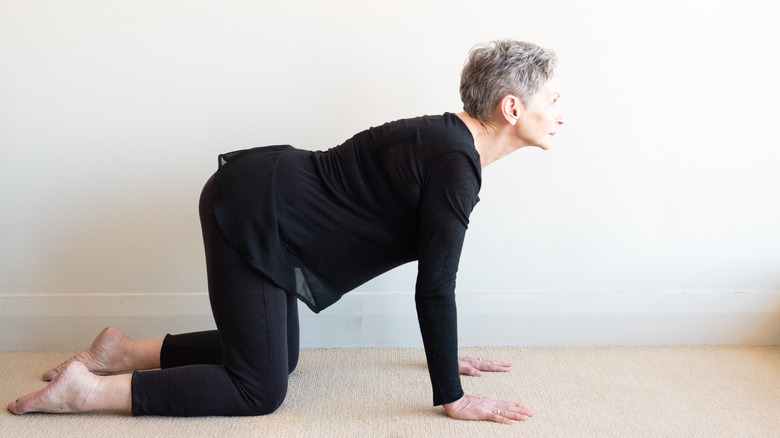How To Handle Stress During Menopause
Menopause is inevitable for every woman, and this transition can be rocky for some. Women are officially in menopause when they haven't had a menstrual period for 12 months, but there is much more to it than that. As periods wane, the body produces fewer female hormones, and this can cause many physical and emotional changes, per the National Institute on Aging (NIA). The years before the menstrual cycle stops is called perimenopause, and that generally triggers a flurry of symptoms such as hot flashes, mood swings, and depression. Menopause is not the same for every woman, which makes it hard to diagnose and deal with.
Menopause doesn't happen overnight. The NIA reports that the perimenopausal phase usually lasts seven years, but it can take up to 14 years. That's a long time to deal with fluctuating hormones; plus, all the changes menopause brings might wreak havoc on your nerves. If stress before or during menopause is an issue, it's important to find coping mechanisms. The good news is there are strategies that can help.
Practice breathing techniques
Practicing breathing techniques benefits everyone, but for women who are dealing with hormone fluctuations, it can be especially helpful because it lowers tension. There are several different ways you can practice breathing techniques, so it should be easy to find a way that works best for you.
Deep breathing exercises are simple to do, and according to the University of Michigan Health. While lying down or sitting, place your hand on your belly. Breathe in through your nose and out through your mouth as you focus on your hand while your belly rises and falls when you breathe. Repeat three to 10 times.
Another type of breathing that helps you relax is called 4-7-8 breathing (via University of Michigan Health). With this type of exercise, you take a deep breath and count to 4, hold your breath for a count of 7, and exhale slowly as you count to 8, trying to empty your lungs completely. Repeat three to seven times.
Try yoga
Yoga is about connecting the mind and body. Verywell Mind explains that yoga involves meditation, mental imagery, and stretching, all of which can help relieve stress. With regular practice, yoga even lowers levels of the stress hormone cortisol. A 2012 review published in the journal Evidence-Based Complementary and Alternative Medicine found that yoga worked effectively in reducing psychological symptoms in menopausal women. Another small study published in Menopause showed that yoga helped reduce insomnia and improve the quality of life among postmenopausal women who were not on any form of hormone therapy.
The good thing about yoga is that you can begin at any level. With or without experience, there are dozens of programs and videos to help you get started. Healthline recommends the following gentle poses to help you get started: cat/cow pose, lunges that target the hip flexors and the psoas muscles, fan posture, sphinx pose, and forward-facing hero pose.
Get better sleep
You might go to bed every night, but do you get sound sleep and wake up refreshed? Good sleep during menopause is difficult for many women, and a lack of sleep may contribute to moodiness and irritability. When you don't get enough sleep, you might end up eating more to stave off feeling sluggish, and that can lead to weight gain, per WebMD. Estrogen helps regulate body temperature at night, so as levels drop, many women wake up with night sweats, and this interruption can result in sleepless nights, per the Sleep Foundation.
You can improve your sleep by avoiding caffeine and alcohol late in the afternoon and at night. Avoid taking naps during the day and develop a routine that helps you unwind before bed. This might look like taking a bath, reading, practicing yoga, or deep breathing. Dress in light, comfortable clothing to keep your body temperature down. If you wake up in the middle of the night, try to stay in bed and avoid doing anything that will keep you awake, such as looking at your phone or the television (via the Sleep Foundation).
Focus on a healthy diet
A healthy diet is important for everyone, but women who are experiencing perimenopause or menopause need to get the right amount of nutrients to ensure optimal mental health. One of the most important things you can do is stay hydrated, according to Everyday Health. Being the slightest bit dehydrated can raise cortisol levels, which can increase the amount of stress you feel. You should also make sure you're getting enough calcium and vitamin D because this combination helps stabilize your mood. Vitamins B6 and C also help fight stress. Omega-3 fatty acids should also be a part of your diet because they boost your brain and heart health. Folate is an important nutrient because it aids in the production of the feel-good hormone dopamine.
There are also foods you should avoid to manage stress levels (via Everyday health). Alcohol might make you feel less stressed while you drink it, but the truth is that drinking too much or dependence on it can lead to depression, so it's best to avoid it. Caffeine may give your energy a boost, but it can also increase anxiety.
Consider cognitive behavioral therapy
If your stress levels are at an all-time high, and nothing you do seems to make much of a difference, you can always try cognitive behavioral therapy (CBT). CBT helps people deal with many problems, including stress and anxiety. It involves many methods, but when it comes to dealing with stress, CBT helps people address unhealthy thought patterns and behaviors while offering problem-solving and coping skills for all areas of life (via American Psychological Association).
CBT usually begins with the help of a therapist who will create content for sessions based on an individual's needs. However, the goal of CBT is to help people become their own therapists over time, equipping them with the tools needed to deal with stressors, per the American Psychological Association.
Evidence suggests that CBT offers benefits. A 2021 review published in Climacteric showed that menopausal women suffering from stress, sleep problems, and moodiness saw an improvement in their symptoms after CBT therapy.






